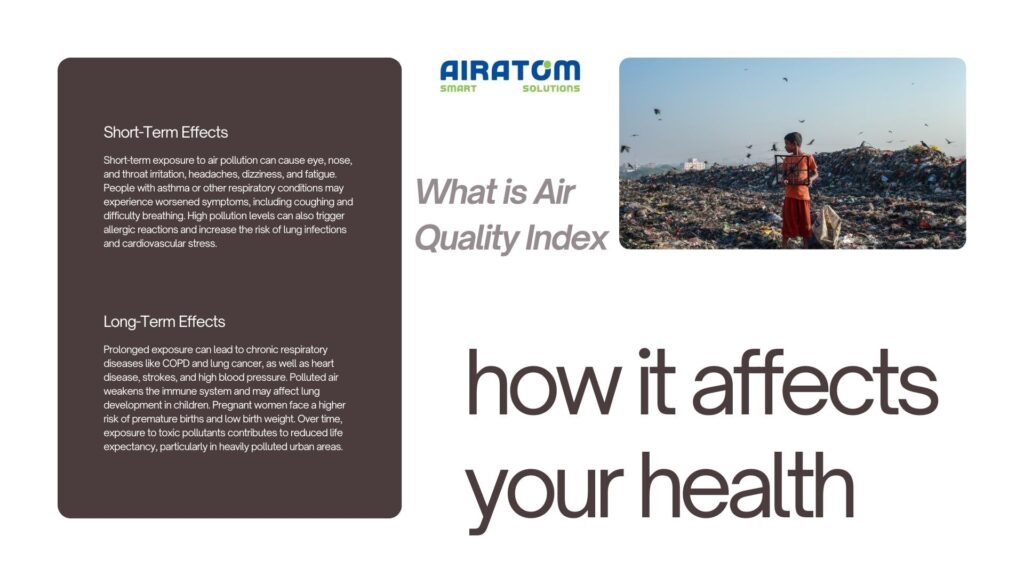- When we hear the term “What is Air Quality Index (AQI)”, many of us immediately think about pollution in big cities. But AQI is more than just a number—it tells us how clean or polluted the air around us is and whether it’s safe to breathe. In this article, we’ll explain what AQI is, how it’s measured, what the numbers mean, and why it matters for your health.
Understanding Air Quality Index
So, what exactly is AQI? The Air Quality Index is a simple system that converts complex air pollution data into an easy-to-understand number. It measures harmful pollutants such as PM2.5, PM10, ozone (O₃), nitrogen dioxide (NO₂), sulfur dioxide (SO₂), and carbon monoxide (CO).
Even if the air looks clear, invisible pollutants can still be harmful. AQI helps people understand the risk level and take necessary precautions.
Why You Should Pay Attention to AQI
Knowing what is Air Quality Index (AQI) is important because air pollution affects our health in many ways. Poor air quality can cause coughing, fatigue, headaches, and aggravate long-term conditions like asthma, lung disease, and heart problems.
Health agencies use AQI data to issue warnings, helping people decide whether to stay indoors, wear masks, or use air purifiers.
Understanding the AQI Scale
The AQI is usually divided into categories that indicate how safe the air is:
0–50 (Good): Air is clean and safe for everyone.
51–100 (Moderate): Generally safe, but sensitive people may notice some effects.
101–150 (Unhealthy for Sensitive Groups): Children, elderly, and people with lung conditions may experience health issues.
151–200 (Unhealthy): Everyone may start experiencing health problems.
201–300 (Very Unhealthy): Health alerts; avoid outdoor activities.
301–500 (Hazardous): Serious health risks; stay indoors.
By understanding AQI levels, you can make smarter choices to protect your health.
How AQI Affects Health
Air pollution affects different aspects of health depending on the AQI level:
Respiratory Health: High AQI levels can irritate airways, trigger asthma attacks, and worsen chronic lung conditions.
Heart Health: Long-term exposure to poor air quality may increase the risk of heart disease and high blood pressure.
Children’s Health: Young lungs are more vulnerable, making it important for parents to monitor AQI.
Elderly and Vulnerable Groups: Seniors and people with pre-existing conditions need to pay close attention to air quality alerts.
How to Stay Safe When AQI is High
Once you know what is Air Quality Index (AQI), you can take steps to reduce exposure:
Check AQI daily using weather apps or government websites.
Limit outdoor activities during high pollution days.
Use air purifiers indoors to remove dust and pollutants.
Wear protective masks like N95 if you need to go outside.
Ventilate wisely—open windows only when air quality is good.
AQI vs. Raw Pollution Data
Some people confuse AQI with raw pollution measurements. While raw data shows exact pollutant levels in micrograms per cubic meter, AQI converts these measurements into a single, easy-to-read score that reflects overall air quality and health risk.
AQI Standards Around the World
Different countries may have slightly different AQI standards:
United States: AQI ranges from 0–500.
India: National Air Quality Index with categories similar to the US.
Pakistan: Highlights PM2.5 as the main concern in urban areas.
World Health Organization (WHO): Recommends stricter air quality limits.
Frequently Asked Questions
Q: What is Air Quality Index (AQI) in simple terms?
A: It’s a number that tells you if the air is safe or harmful to breathe.
Q: Why should I care about AQI?
A: Because it helps you protect your health from air pollution.
Q: What AQI level is considered safe?
A: Generally, 0–50 is safe for everyone.
Q: How often should I check AQI?
A: Daily, especially if you live in a city with high pollution or are in a sensitive group.
Conclusion
Understanding what is Air Quality Index (AQI) is key to staying healthy. It’s more than just a number—it’s a guide to protect yourself, your family, and your community from the harmful effects of air pollution. By checking AQI regularly and taking simple precautions, you can breathe easier and stay healthier.


